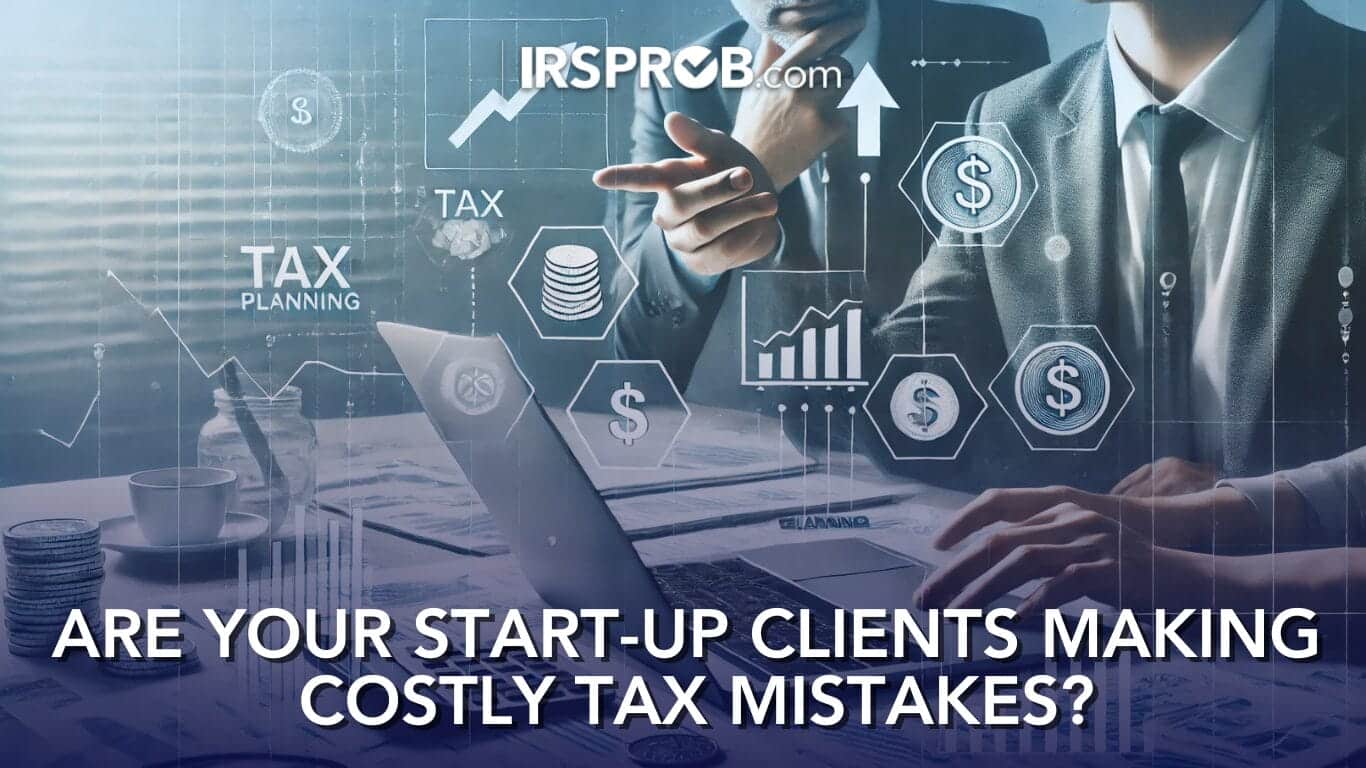
Start-ups often face numerous hurdles, and unfortunately, many new businesses overlook critical tax obligations. Cash flow issues, often stemming from tax missteps, contribute to the failure of 82% of start-ups. As a business advisor, guiding your clients to make informed tax decisions can save them significant costs and set them on a solid path for growth. Here’s how to help your start-up clients avoid common tax pitfalls and optimize their tax strategy from the start.
1. Choosing the Right Entity Structure
Entity structure is one of the first decisions a start-up makes, and it can have long-lasting tax implications. The choice between an LLC, S-Corporation, or C-Corporation affects not only tax rates but also future funding, exit strategies, and owner liabilities.
- LLC (Limited Liability Company): This flexible structure offers pass-through taxation, where profits and losses are reported on the owner’s personal tax return. It’s often chosen for its simplicity and flexibility but may limit some funding options.
- S-Corporation: An S-Corp allows pass-through taxation while also enabling owners to take a “reasonable salary,” potentially lowering self-employment taxes. However, S-Corp status comes with certain restrictions, such as a limit on the number of shareholders.
- C-Corporation: Although subject to double taxation (corporate income and personal income), a C-Corp can be a wise choice if the business plans to attract significant investors or go public. Proper planning here can reduce the tax burden during future funding rounds and exit events.
Careful consideration of these factors at the outset can help minimize future tax liabilities and position the business for growth.
2. Founder’s Stock and 83(b) Elections
For start-ups issuing founder’s stock, the 83(b) election is crucial. This election allows founders to pay taxes on stock at its current, often minimal, value, rather than its potentially higher value later.
- 83(b) Election: Filing this election within 30 days of receiving restricted stock allows the founder to lock in the stock’s current value for tax purposes. This minimizes the tax liability if the stock appreciates significantly over time, potentially saving up to 20% on capital gains tax.
- Capital Gains Benefits: Holding onto the stock for more than a year allows the founder to qualify for lower long-term capital gains rates. By planning for these tax implications early, start-ups can preserve cash flow and incentivize founders effectively.
3. Leveraging R&D Tax Credits
The Research & Development (R&D) tax credit is one of the most underutilized credits available to start-ups. Many companies qualify for this credit, which can significantly reduce payroll tax liabilities.
- Eligibility for R&D Credits: Activities like developing or improving products, processes, or software can qualify for this credit. The IRS offers credits up to $250,000 against payroll taxes, but eligibility requires thorough documentation.
- Impact on Cash Flow: The R&D credit can provide immediate tax relief by offsetting payroll taxes, freeing up funds for other business needs. For start-ups, this can be a game-changer in managing early-stage expenses.
4. Tax-Efficient Employee Compensation and Stock Options
Employee compensation packages are critical for attracting talent, especially in competitive markets. But without proper planning, equity-based compensation can lead to unintended tax consequences.
- ISO vs. NSO: Understanding the difference between Incentive Stock Options (ISOs) and Non-Qualified Stock Options (NSOs) is essential. ISOs offer tax advantages but come with strict requirements and may trigger the Alternative Minimum Tax (AMT) if not carefully managed. NSOs, on the other hand, are simpler but don’t carry the same tax benefits.
- Potential Tax Savings: Designing compensation packages that align with tax regulations can reduce employee tax liabilities by up to 20% and strengthen employee satisfaction, helping start-ups attract and retain key talent.
5. State and Local Tax (SALT) Compliance
With the rise of remote teams, state and local tax obligations (SALT) have become increasingly complex. Nexus laws determine when a business has a tax presence in a state, which can trigger income, payroll, and sales tax obligations.
- Nexus Considerations: Different states have different rules for nexus. For example, if a business has remote employees or significant sales in a state, it may be required to pay taxes there. Failing to comply can result in costly penalties and interest.
- Sales Tax Planning: Many states impose sales tax on goods and services. Early planning ensures that start-ups avoid unexpected liabilities, which can be particularly challenging for businesses operating in multiple states.
6. Capital Gains Planning and QSBS Eligibility
For start-ups expecting rapid growth, the Qualified Small Business Stock (QSBS) exclusion can be a valuable tool. It provides an opportunity to exclude up to $10 million in capital gains when selling QSBS-eligible stock.
- QSBS Requirements: To qualify, the stock must be held for at least five years and meet other criteria. Planning around QSBS eligibility can significantly reduce the tax burden on founders and early investors.
- Future Planning: Structuring stock issuance and ownership from the beginning helps ensure that founders and investors can leverage QSBS exclusions when the time comes to sell, potentially saving millions in taxes.
Early Tax Planning as a Competitive Advantage
The tax decisions made in the early stages of a business’s life cycle are critical. Instead of viewing tax planning as a cost, start-ups should consider it an investment that can generate substantial returns, both immediately and in the long run. The right tax strategy not only saves money but also fosters growth by freeing up capital for reinvestment, allowing start-ups to scale faster and with greater financial stability.
Final Thoughts
Navigating tax requirements can feel overwhelming for start-up founders, but a solid tax strategy is essential for their success. By advising on entity selection, compensation structures, SALT compliance, and capital gains planning, you can provide invaluable guidance that positions start-ups for sustainable growth. Early tax planning is more than a box to check—it’s a strategic move that turns tax into a growth lever, helping your start-up clients thrive.
By supporting start-ups with these strategies, you’re not just helping them save money—you’re setting the foundation for their long-term success.









